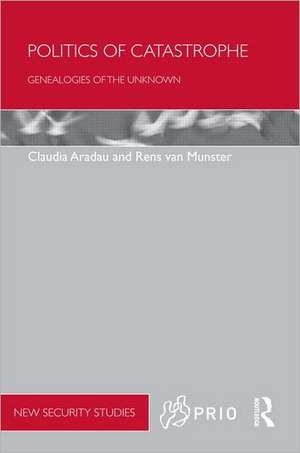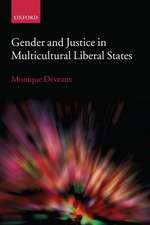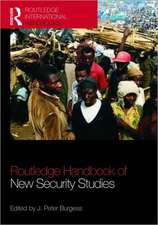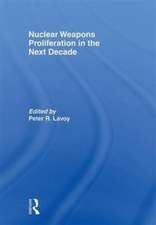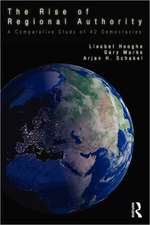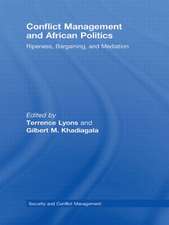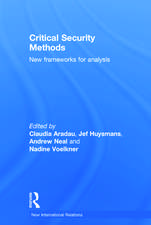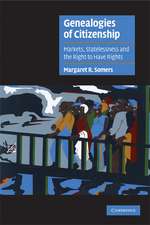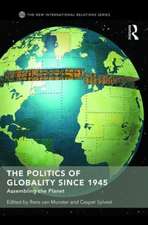Politics of Catastrophe: Genealogies of the Unknown: PRIO New Security Studies
Autor Claudia Aradau, Rens Van Munsteren Limba Engleză Hardback – 4 mai 2011
At a time where catastrophe increasingly functions as a signifier of our future, imaginaries of pending doom have fostered new modes of anticipatory knowledge and redeployed existing ones. Although it shares many similarities with crises, disasters, risks and other disruptive incidents, this book claims that catastrophes also bring out the very limits of knowledge and management. The politics of catastrophe is turned towards an unknown future, which must be imagined and inhabited in order to be made palpable, knowable and actionable. Politics of Catastrophe critically assesses the effects of these new practices of knowing and governing catastrophes to come and challenges the reader to think about the possibility of an alternative politics of catastrophe.
This book will be of interest to students of critical security studies, risk theory, political theory and International Relations in general.
| Toate formatele și edițiile | Preț | Express |
|---|---|---|
| Paperback (1) | 416.47 lei 3-5 săpt. | +14.45 lei 7-13 zile |
| Taylor & Francis – 17 apr 2012 | 416.47 lei 3-5 săpt. | +14.45 lei 7-13 zile |
| Hardback (1) | 1053.79 lei 6-8 săpt. | |
| Taylor & Francis – 4 mai 2011 | 1053.79 lei 6-8 săpt. |
Din seria PRIO New Security Studies
- 8%
 Preț: 416.47 lei
Preț: 416.47 lei -
 Preț: 363.03 lei
Preț: 363.03 lei -
 Preț: 411.04 lei
Preț: 411.04 lei - 13%
 Preț: 336.90 lei
Preț: 336.90 lei -
 Preț: 482.78 lei
Preț: 482.78 lei -
 Preț: 431.35 lei
Preț: 431.35 lei -
 Preț: 388.85 lei
Preț: 388.85 lei -
 Preț: 453.56 lei
Preț: 453.56 lei -
 Preț: 412.27 lei
Preț: 412.27 lei -
 Preț: 440.59 lei
Preț: 440.59 lei -
 Preț: 408.38 lei
Preț: 408.38 lei -
 Preț: 485.40 lei
Preț: 485.40 lei -
 Preț: 280.67 lei
Preț: 280.67 lei -
 Preț: 446.53 lei
Preț: 446.53 lei -
 Preț: 469.34 lei
Preț: 469.34 lei -
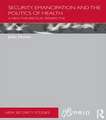 Preț: 406.81 lei
Preț: 406.81 lei -
 Preț: 389.38 lei
Preț: 389.38 lei -
 Preț: 389.38 lei
Preț: 389.38 lei -
 Preț: 385.54 lei
Preț: 385.54 lei -
 Preț: 349.53 lei
Preț: 349.53 lei - 18%
 Preț: 1110.61 lei
Preț: 1110.61 lei -
 Preț: 389.11 lei
Preț: 389.11 lei -
 Preț: 469.34 lei
Preț: 469.34 lei -
 Preț: 438.14 lei
Preț: 438.14 lei
Preț: 1053.79 lei
Preț vechi: 1285.11 lei
-18% Nou
Puncte Express: 1581
Preț estimativ în valută:
201.65€ • 215.63$ • 168.13£
201.65€ • 215.63$ • 168.13£
Carte tipărită la comandă
Livrare economică 17 aprilie-01 mai
Preluare comenzi: 021 569.72.76
Specificații
ISBN-13: 9780415498098
ISBN-10: 0415498090
Pagini: 176
Ilustrații: 9 halftones
Dimensiuni: 156 x 234 x 15 mm
Greutate: 0.43 kg
Ediția:1
Editura: Taylor & Francis
Colecția Routledge
Seria PRIO New Security Studies
Locul publicării:Oxford, United Kingdom
ISBN-10: 0415498090
Pagini: 176
Ilustrații: 9 halftones
Dimensiuni: 156 x 234 x 15 mm
Greutate: 0.43 kg
Ediția:1
Editura: Taylor & Francis
Colecția Routledge
Seria PRIO New Security Studies
Locul publicării:Oxford, United Kingdom
Public țintă
Postgraduate, Professional, and UndergraduateCuprins
1. Introduction 2. Securing Catastrophic Futures 3. Conjectures of Catastrophe: ‘The Next Terrorist Attack’ 4. Economies of Catastrophe 5. Imagining Catastrophes 6. Aesthetics of Catastrophe 7. Catastrophe, Exception, Event 8. Conclusion
Notă biografică
Claudia Aradau is Senior Lecturer in International Relations at King's College London. She is the author of Rethinking Trafficking in Women: Politics out of Security.
Rens van Munster is Senior Researcher at the Danish Institute for International Studies (DIIS). He is the author of Securitizing Immigration: The Politics of Risk in the EU.
Rens van Munster is Senior Researcher at the Danish Institute for International Studies (DIIS). He is the author of Securitizing Immigration: The Politics of Risk in the EU.
Recenzii
'[The authors] offer cutting and quite thrilling critiques of Western security practices - theoretically adept and beautifully written, they are at the forefron of exciting new research to come.' - Peter Adey, Radical Philosophy, 176, November/December 2012
‘This book advances our understanding of the complex and often paradoxical terrain of the catastrophe as a field of knowledge and target of anticipatory governance. In doing so, its authors stand at the forefront of new thinking about contemporary regimes of security, power and governmentality.’ - Mitchell Dean, University of Newcastle, Australia
'This excellent volume is the first book-length engagement with the implications of catastrophe for contemporary practices of security governing. It is an important contribution to our current understandings of the politics of preemption, and it is indispensable reading for anyone interested in the contemporary logic of security and securitization.' - Mariek de Goede, University of Amsterdam
'[T]his is a well-crafted and historically grounded comparative study that makes a welcomed and valuable contribution to the literature on foreign policy Europeanization and Europe−Latin America relations. Highly recommended for practitioners, students and scholars alike.' - Antonio Raimundo, NICPRI-University of Minho, Portugal
'In addition to the discussion of emergent ways of anticipating the future and positioning political subjectivity, this excellent book establishes new paths by which to appropriate catastrophe conceptually. Overall, this book works both to consolidate and seriously further our understanding of the complex relations between knowledge and what it means to govern - and be governed by - unknown futures.' Nathaniel O'Grady, Durham University, Political Theory Journal
‘This book advances our understanding of the complex and often paradoxical terrain of the catastrophe as a field of knowledge and target of anticipatory governance. In doing so, its authors stand at the forefront of new thinking about contemporary regimes of security, power and governmentality.’ - Mitchell Dean, University of Newcastle, Australia
'This excellent volume is the first book-length engagement with the implications of catastrophe for contemporary practices of security governing. It is an important contribution to our current understandings of the politics of preemption, and it is indispensable reading for anyone interested in the contemporary logic of security and securitization.' - Mariek de Goede, University of Amsterdam
'[T]his is a well-crafted and historically grounded comparative study that makes a welcomed and valuable contribution to the literature on foreign policy Europeanization and Europe−Latin America relations. Highly recommended for practitioners, students and scholars alike.' - Antonio Raimundo, NICPRI-University of Minho, Portugal
'In addition to the discussion of emergent ways of anticipating the future and positioning political subjectivity, this excellent book establishes new paths by which to appropriate catastrophe conceptually. Overall, this book works both to consolidate and seriously further our understanding of the complex relations between knowledge and what it means to govern - and be governed by - unknown futures.' Nathaniel O'Grady, Durham University, Political Theory Journal
Descriere
This book argues that catastrophe is a particular way of governing future events – such as terrorism, climate change or pandemics – which we cannot predict but which may strike suddenly, without warning, and cause irreversible damage.
